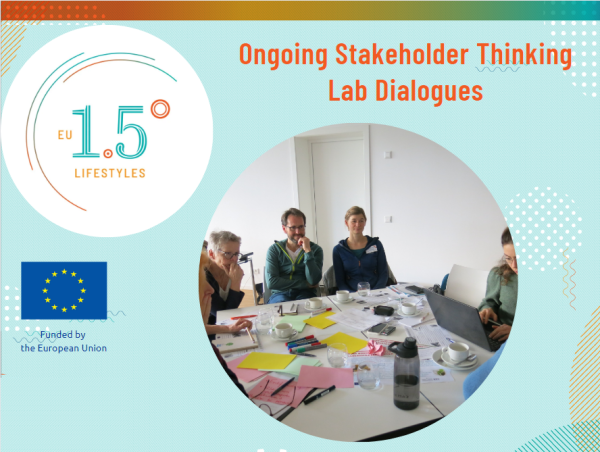
As part of our commitment to driving societal transformation, the EU 1.5° Lifestyles project team is actively engaged in a series of Stakeholder Thinking Lab (STL) dialogues in the five case countries of Germany, Hungary, Latvia, Spain, and Sweden. These dialogues are a crucial element of our mission to understand the structural enablers and barriers to enabling members of society to live lifestyles aligning with the 1.5° climate objective outlined in the Paris Agreement.
Our ongoing efforts involve the collaboration of experts and thought leaders in a dynamic exchange of ideas and strategies.
We are currently conducting focus group dialogues in five case countries, with each country hosting six dialogues. The aim is to collectively explore innovative strategies, identify challenges, and devise local and EU-wide solutions to reduce consumption (while ensuring welfare) in various domains.
The dialogue topics cover essential policy options and objectives related to consumption within sustainable lower and upper bounds, with an emphasis on impactful options for a sustainable future. The focus areas include:
- Reduction in meat consumption [NUTRITION]
- Reduction in air travel [LEISURE]
- Implementing an upper limit on Residential Floor Space [HOUSING]
- Reduction in car ownership in cities [MOBILITY]
- Working Time Reduction (30 Hour Work Week) [WELFARE]
- Regulations for sustainable (sufficient) BM [BUSINESS MODELS]
Our structured approach involves guiding questions designed to facilitate a meaningful exchange of insights. From identifying barriers and enablers to understanding responsible actors and building coalitions, each dialogue is an exploration of potential pathways toward (more) sustainable consumption amd production practices.
You can see a short video of the STL2 dialogues taking place in Hungary, here.
If you or your colleagues are participating in these dialogues, we appreciate your invaluable contributions to shaping the future of sustainable lifestyles. The insights and recommendations generated during these sessions will play a crucial role in our project's mission.
We acknowledge and extend our gratitude for the active participation and engagement of the involved stakeholders.
Stay tuned for updates on the outcomes of these dialogues, as we continue to analyse the gathered data!
RIFS

